| Short cuts : | Home | Contents | Photos | Ramblings | Contacts | Whats new | : : : | : : : |
I came across three Peter Lovesey books in the £1 bargain section of "The Works" bookshop. I noticed that they were the first three in the Sergeant Cribb historical detective fiction series, that Peter Lovesey was a multi award winning writer and so I thought "why not, lets give them a try." Peter Lovesey wrote two main series - the Victorian Era Cribb, 8 book series (1970 to 1978), and the later contemporary, Bath based, Peter Diamond 17 plus book series (1991 to 2017 and still going, I think).
Peter Lovesey was born in Middlesex in 1936, and educated at Hampton Grammar School. Aged 19 he then progressed to Reading University but in 1955 could not study English without a latin qualification and so had to settle for Fine Art with History and English as elective subjects. His essays so impressed his English tutors that they allowed him onto the English course after all. He graduated with honours in 1958, then did 3 years National service in the RAF as an education officer. This gave him an entrance to a 14 year teaching career ending up as Head of General Education at what is now West London College. He became a full time writer in 1975.
He had married Jacqueline Lewis back in 1959, and they now live near Chichester. They had two children, Kathy in 1960, and Phil in 1963. Phil followed his dad in that he also became a teacher, and then also wrote crime novels ! Peter won awards from the British Crime Writers Association and various Lifetime Achievement awards in France, the UK, and America. He wrote various other assorted books, three under the pen name of Peter Lear.
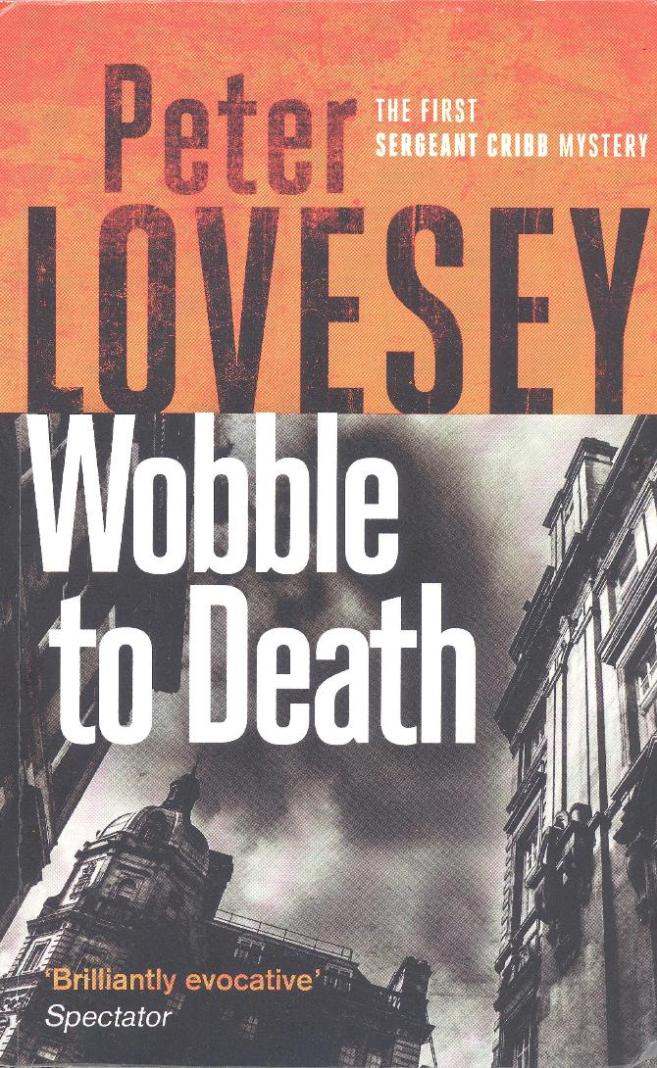
I read this book in May, 2019.
One of the things I like about crime fiction is that it can be set in a wide variety of places - anywhere in the UK, including Shetland, and almost anywhere in the world from Sweden and Norway to Alaska, to Malaysia, etc - and in a similarly wide variety of times. "Wobble to Death" is book one in the Sergeant Cribb and Constable Thackeray series, and is set in the Victorian London of 1879. The book won a Macmillan/Panther first crime novel prize.
The book opens with us meeting various competitors in a 6 day endurance walk/ run, apparently all the rage in the 1870s. The idea was to walk as far as possible in the alloted time, stopping as long or as little as you like for sleep, food, and toilet breaks. Captain Chadwick was an officer and a gentleman who usually did his walking along open roads. Mr Darrell is also a professional walker (a Ped) who did his walking round and round indoor tracks. These endurance races were called Wobbles, and one such wobble was arranged by a promoter, a Mr Herriot, to take place in the Islington Agricultural Hall. This was usually a cattle mart, and the smell of the animals was everywhere. This was the first meeting of Chadwick versus Darrell. They were to compete in the inner of two concentric tracks, eight circuits to a mile, and the other competitors, riff raff, jostled around the outer track, seven circuits to the mile. Erskine Chadwick, the favourite, had his former batman Harvey to prepare his meals, etc, and Charles Darrell had a trainer Monk to assist him, and his wife Cora also visited at assorted times. The other competitors were mostly a mixed bunch of tough ruffians, but there was a surpringly small man there too - Mr Mostyn-Smith. All were there for the money, but Mostyn-Smith who had a medical degree was testing his scientific nourishment theories. If he did well he would market a range of health foods. There was a lot of money to be won, and a lot of gambling. An "orchestra" had been hired to entertain the attending crowds.
Its a good evocation of time and place, and the first five chapters are all about the excitement of the endurance race. Whilst Darrell is racing his attractive wife needs needs alternative company, i.e. a succession of men visitors. Darrell collapses and dies of apparent exhaustion in chapter six, but it turns out to be poisoning and so we meet DS Cribb and DC Thackeray. Crib is about 40, tall and wiry, and Thackey is slightly older, stocky, and well built. Surprisingly we don't learn much more about our two detectives - but we learn that there is a Mrs Cribb at the very end of the book.
There is a second murder, and the question is can Cribb and Thackeray identify the murderer within six days - after which all the suspects will scatter and disappear. Thackeray does most of the foot work, but is no fool, and Cribb is always interested in getting his input. The mystery is not solved by Cribb until the very end, and there is an exciting handsom cab chase through foggy London.
I thought it was all a bit underplayed and understated, but well enough written, and a clever enough plot. We will need to see how the series progresses, and perhaps we will learn more about Cribb's and Thackeray's private lives in later outings.
Links to author index and home page
| Peter Lovesey Heading | Author Index | Go to Home Page |
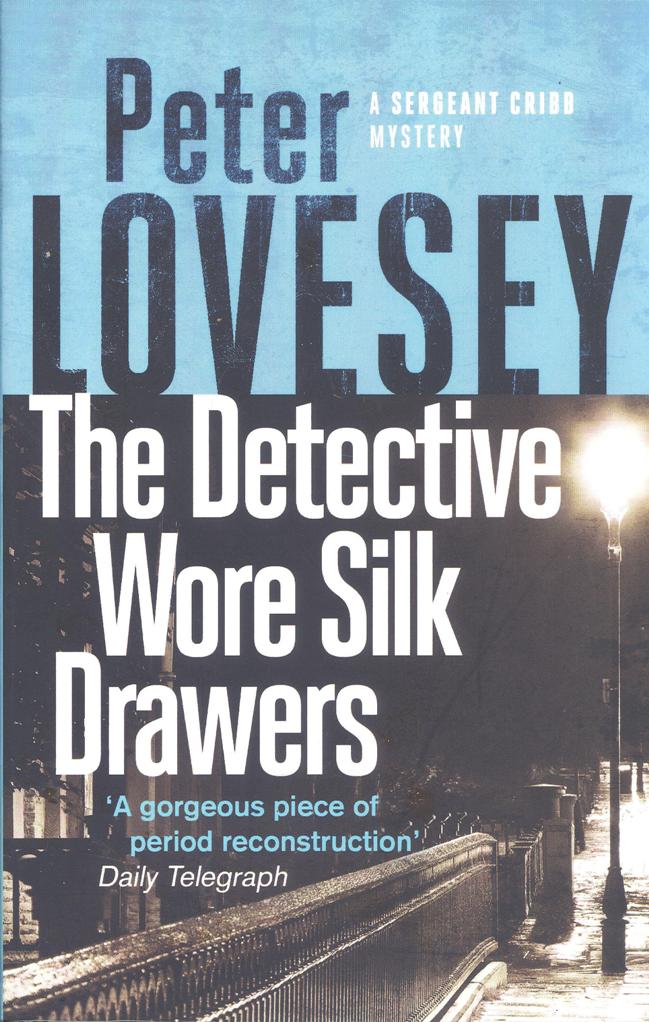
I read this book in June, 2019.
This is book two in Peter Lovesey's Sergeant Cribb series set in the 1860's in the early days of Scotland Yard. London is split into several police divisions mostly with an inspector in charge, but two of the divisions are under police sergeants, and Sergeant Cribb is one of these. Cribb's boss Inspector Jowett is being chased to improve murder clear up rates, and so is chasing Cribb in turn. A new case presents itself when a headless corpse is fished out of the Thames. It is difficult to identify without the head, but Cribb works out that this is the body of a prize bare knuckle fighter - the hands had been pickled to toughen them up. Boxing was a popular sport - the gloved Marquis of Queensbury rules type. Bare knuckle fighting had been outlawed in the 1850's but it still took place in secret locations - usually sited near county boundaries so that if local police turned up, everyone could cross into the next county. Cribb asks for DC Thackeray to be transferred to his section to assist. Thackeray has no say in the matter.
We also meet a new young policeman - constable Henry Jago. Unusually he is public school educated, but he wanted to be a detective. More importantly he is a gifted amateur boxer. Sergeant Cribb pulls rank on Jago, and uses him to infiltrate the bare knuckle fighting scene. Several other fighters had recently gone missing - were they headless corpses too ?
Cribb is a good detective, but he seems indifferent to the danger into which he puts his men. Jago will be badly injured if he comes up against an experienced bare knuckle bruiser - in fact his life could be at risk. "You'll be OK " says Cribb, but it's not Cribb who has to get into the ring. We also find that Thackeray does not volunteer to work under Cribb - he is summoned and has no say in the matter.
Lovesey seems to have done his research well, and again we have a good depiction of place and time. I though some of the fictional newspaper accounts of the bare knuckle fights seemed very authentic. The action now moves to Radstock Hall, where a very rich and beautiful widow Mrs Vibart runs a strange bare knuckle training camp. Mrs Vibart seems to be a sadist intent on seducing new young trainee Henry Jago. Poor Jago - he has a girlfriend, but has too lowly a job to ask for her hand. His cover is that he wants to earn a lot of money quickly to impress his girlfriend's father.
The story was OK, and I enjoyed reading it. Everything works out in the end. Having solved the headless corpse cases, Cribb half expects praise / perhaps even promotion but he is kept waiting outside Inspector Jowett's office. Someone gets well deserved promotion, but it's not Cribb. Finally, the "silk drawers" of the title refers to the boxing shorts Jago has to wear.
Links to author index and home page
| Peter Lovesey Heading | Author Index | Go to Home Page |
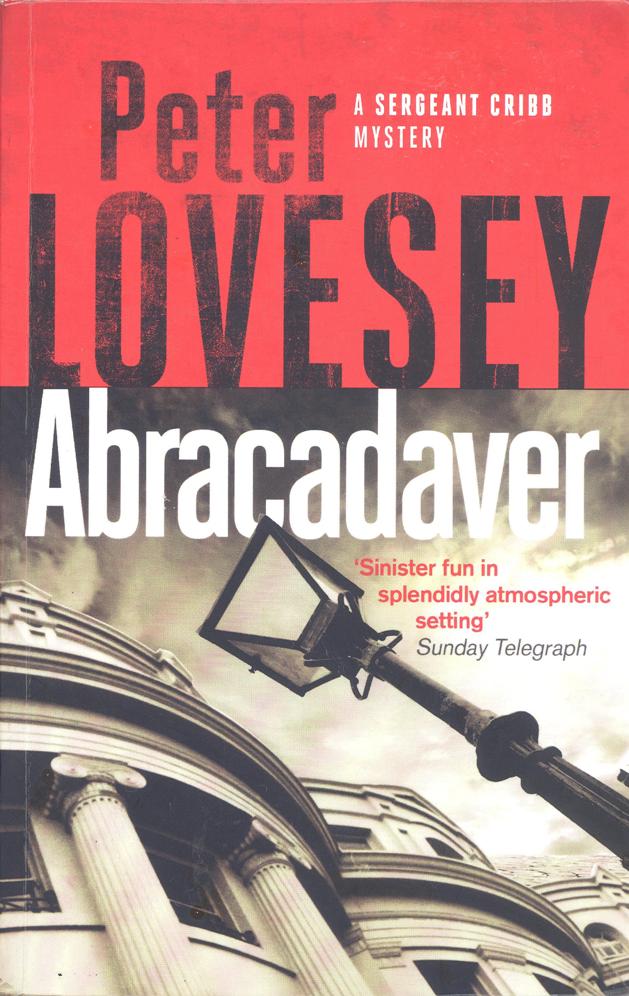
I read this book in August, 2019.
This is book three in Peter Lovesey's crime series set in Victorian London, and another outing for Sergeant Cribb, and his assistanct PC Thackeray. I like series that are different, and this series really is different. However I thought this book was a bit weak in respect to the main crime. Thackeray complains most of the way through the first half of the book that what they are investigating is hardly worthy of their abilities. He will work flat out to help solve a murder, but here he is investigating what seems to be only pranks - a series of mishaps that have happened to a variety of music hall artists. A trapeze artist misses her timing when her ropes are shortened, a comedian invites an audience sing along, but finds the words altered embarrassingly, mustard is applied to the sword of a sword swallower, a singer's costume malfunctions, a girl in a magicians box is trapped, etc. The artists concerned are now sources of ridicule, and unemployable. They are rescued by an artists' charity and given very comfortable lodgings with fellow performers at Philbeach House. It's all an elaborate and unbelievable ploy to get recruits to work at a "special" late night performance at the Paragon music hall - where daring (for the time) nude review is performed in front of a very select audience. The owner of the Paragon is Mr Plunkett. His daughter is Miss Blake who performs demure songs and does not approve of her father's late night review. She has fallen in love with a strong man Albert and will do anything to "get her man". Albert too had been at Philbeach House - someone switched a savage dog in his act for his usual docile pet, and Albert got bitten on the leg. In short, though, it's all very silly and I was not impressed.
I am not sure exactly when this story is set. I thought it might be the 1880s as there is a reference to an 1870 law enacted about ten years earlier - but if so, the previous story cannot be set in 1860, as I thought at the time. There is a bit of mild humour in Thackeray's discomfort in having to mix with scantily clad chorus girls. The depiction of the say 1880's London is well done, with lots of detail about the cost of things, straw on the floor of the omnibus, etc. We also meet the major, a private investigator, whom Cribb uses to continue the investigaion when warned off by his superior - a DI Jowett. The "private" late night performance at the Paragon is frequented by many influential members of top society - hence Cribb is warned to back off. Finally there is a murder which Cribb does solve - but Jowett gives the credit to the private investigator as he does not want the police blamed for eventually closing the late night review.
I liked books one and two, but this one less so. It's OK really but nothing to write home about.
Links to author index and home page
| Peter Lovesey Heading | Author Index | Go to Home Page |
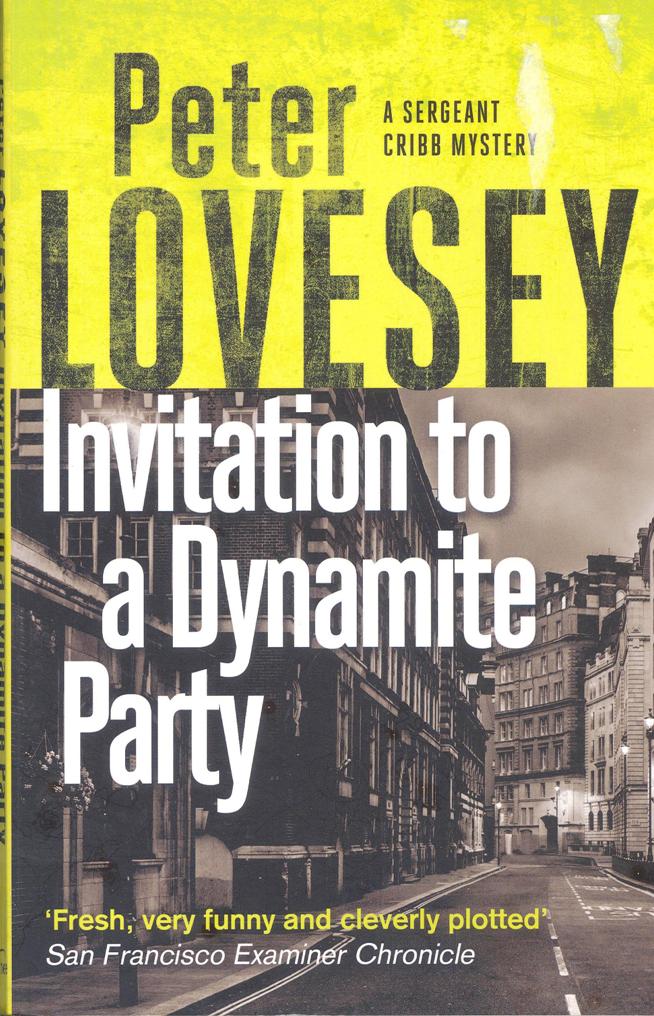
I read this book in December, 2023
This is book 5 in the Sergeant Cribb series by Peter Lovesey. It's set in 1884. Although not the best of series, it's one I read periodically as it's different, and the depiction of Victorian London is well done. I will stick to my Characters, then Personal Lives, and finally Plot sequence, but really there are no personal lives stories, and the series is all the poorer for it.
Characters : Our hero is Detective Sergeant Cribb of Scotland Yard, his superior is Inspector Jowett, and his assistant is PC Thackeray. No Christian names are given. Cribb is in his forties, and married. The plot involves an Irish secret society, Clan-na-Gael, and Irish Americans, all intent on causing mass murder and mayhem to advance their sacred cause - Home Rule for Ireland. Sect leaders in England are Mr McGee, and his daughter Rossanna who is in her early twenties. There are four Irish American conspirators, Shanahan, Creed, Patrick Devlin, and a goliath of a man, T. P. Malone. They are later joined by important group leaders over from America - Mr Carse, and Mr Millar.
Personal Lives : Although there are no real personal lives stories, there could have been a strong one of romance between young Rossanna, and Sergeant Cribb. Generally it's a very class divided society. The Royal Arsenal at Woolich has a 3 mile long railway to transport it's 10,000 employees, with first, second and third class carriages - third for the manual workers who sit back to back in the open air and rain. Those in authority never consult, but just issue orders. Jowett tells Cribb he will live on site at the Arsenal - no notice, no discussion. Just about everyone smokes. Pubs give out free clay pipes, and the workers abandon them in piles at the entrance to the Arsenal - strictly no smoking, obviously, where there are explosives. Cribb knows Thackeray as a 6 ft grey, loyal, dependable and brave assistant, but they have never mixed socially, (and nor has Jowett with Cribb). When Cribb is told his assistant might be a spy, Cribb has to wonder just how well he really does know Thackeray.
Plot : The main plot is about a secret Irish society, Clan-na-Gael, financed by rich Irish Americans, planning and executing mass murder and mayhem to promote Home Rule for Ireland. Bombs were left at a variety of railway stations, or other public places, or targetting famous people. These bombings have started up again, the Irish Section of the Secret Service are struggling. The bombers know where to target, and seem able to plant their bombs undetected. It is suspected that they have inside knowledge - a spy withing the police. The book opens with Cribb and Jowett at the Royal Arsenal at Woolich. Cribb is to be trained as the police explosives / bombs expert - on an intensive 7 am to 9 pm, 6 days a week course. "Why me ?" he asks. Because we suspect that it's your assistent, PC Thackeray, who is the spy. Thackeray has a day off on Thursday, and so Cribb is excused to follow Thackeray. He finds him in an Irish pub that Thackeray has started using. Thackeray explains that he is not known as a policeman there, and he can pick up useful local gossip and criminal intelligence. He easily explains his frequent visits to railway stations - he is a train spotter, he loves railways, engines, everything to do with rail. Talking to Cribb, he mentions having been bought drinks by a huge American by the name of Malone, who wanted to know all about railways and railway stations. In all innocence, Thackeray had indeed been supplying information - he didn't realise what was going on.
After 3 weeks on the coarse, Cribb is called back to Scotland Yard. There were 3 explosions last night, Thackeray is missing, and the policeman who was was tailing him was fished out of the Thames with a bullet in his skull. Thackeray's description of Malone as huge, strong, but with manicured hands which smelled of surgical spirits, gives Cribb a Sherlock Holmes type clue. He may be a field event athlete, not a rower, but subject to infrequent training - i.e. hammer throwing. Cribb consults sporting newspapers in Fleet Street and finds that 4 American hammer throwers are in town for the athletics competition at Lillie Bridge - Shanahan, Creed, Patrick Devlin, and giant T. P. Malone. Malone is obviously the man Thackeray met. Cribb visits a pub near Lillie Bridge, gets friendly with some competition officials, steals one of their official judge rosettes, enters the games field as a judge, and so gets to judge hammer throwing and speak to the Americans. Malone is all strength, but poor technique. Patrick Devlin is the better athlete. Cribb tells Devlin he has Irish blood in him, gives him the best malacca shafted hammer, and insists on a re-measure making Devlin the winner. "You are indeed a true friend of Erin", Devlin tells Cribb, and invites him for a drink. Cribb learns that Malone is staying in a posh hotel near Piccadilly. Cribb breaks into his room, searches it, and notices that his hammer propped in the corner is suspiciously light. There is a join in the shaft which Cribb unscrews revealing 4 vials of dynamite. These are indeed the Dynamiters.
Rushing to tell Jowett, Cribb leaves the hotel, hails a cab, tells the cabbie "Scotland Yard" and jumps in only to find Devlin there, pointing a gun at him. Suspicious of Cribb's questions, he has now caught him leaving Malone's hotel. "I am taking you to see someone more important than Malone". They go to a secluded propery in the country. This more important person seems to be a young girl in her twenties - Rossanna McGee. She is very capable, but sends for their leader, her father, Mr McGee. He is a face hooded cripple in a wheel chair, horribly disfigured and injured in an explosives accident but communicating via Rossanna with dumb hand language. Apparently he still retains full intellect. (Much later we will find this is a lie). Cribb repeats that he has Irish blood, and wants to work for the cause, yes, but mostly for money. He says he is an adventurer, skilled in explosives, and tells them they are leaving the bombs in all the wrong places and a lot of your bombs don't explode. As a test he is taken by launch along the Thames to help Malone steal 3 cwt of best quality Nobel Dynamite stored in hulks in a cutting off the Thames. All is going well, they get half the Dynamite loaded, but as they lower the 4th load, it slips and falls onto the launch deck. Malone screams, and jumps into the water - the scream alerts those guarding the Dynamite, and they have to flea. Rossanna is impressed by Cribb's bravery (he never flinched, she knows him as Mr Sargent) but disgusted at Malone. Out in the river, she takes Malone aside, says "Ireland has no need for cowards", and shoots him. Cribb is incensed, grabs the gun, throws it away, and shakes Rossanna. Get below, out of my sight before I give you a good thrashing. No one has dared speak to her like that before. Later Rossanna apologises to Cribb - I was wrong, my shot could have detonated the dynamite. Thank you. Cribb is in. Rossanna is impressed and seems to be falling for this strange adventurer.
The story now takes off, but I'll add just a little more before leaving you to read the rest. Cribb has to make two identical waterproof bombs. Mr McGee will chose one to demonstrate Cribb's prowess - a very important demonstation as the two chief leaders of the clan have come over from America. They are ruthless killers - Mr Carse, and Mr Millar. As Rossanna takes Cribb to see the target for his demo bomb, a folley on the lake edge, her petticoat gets caught in some thorns, and Cribb goes to help her extricate herself. She grabs hold of him, they fall in a tangle of lace, Cribb's hand in an unseemly place, and his face pressing down on Rossanna's breasts. She is not in the least upset, but tells him they have work to do, and to cool his ardour, but adds "cool it for a few days". The demonstation is a success, Cribb will be initiated to Clan-na-Gael. Cribb suspects Thackeray is being help as a prisoner in the same building as he is in, and at 2 am, he sneaks downstairs to contact him, and tell him that help is at hand, but not for a few days yet. Someone is coming, and so Cribb has to beat a hasty retreat through the nearest door. Unfortunately he has entered Rossanna's bedroom. To bluff it out, Cribb makes a pasionate speech - but it's only to Rossanna's empty bed. But now Rossanna is returning, and so Cribb dives out of another door - and finds himself in the bedroom of her fully awake father, Mr McGee. Out of the frying pan into the fire! Patrick Devlin and a huge team of workers had been hammering away at some project in an outbuilding. We now learn it's a 3 person, electric powered submarine. The target is the Prince of Wales. The 2nd bomb will be set to 10:00 am and, using the submarine, placed below a pier from which he will embark tomorrow. Mr Carse cares little for other people's lives. He changes the plan - the submarine will be loaded with extra dynamite, and the bomb will set it off. Mr McGee will be a great Irish martyr. Rossanna protests at the proposed death of her father - Millar goes to punch her, but Cribb intervenes, says no violence, grabs Rossanna in a fireman's lift and takes her to her bedroom. He says he will save her father, but asks her to trust him. "I do trust you", she says. Cribb goes to warn Thackeray, but Carse is waiting for him. He had thought the death of Malone and the immediate arrival of an explosives expert just a little too suspicious. So now, Thackeray and Cribb are tied up, and loaded on to the submarine to go to their deaths with McGee who is navigating the craft. I really have said too much now - but set up a real puzzle of an escape and a thrilling boat chase.
Overall I thought it was quite a good, event packed, clever story - although a bit slow to get going. But there is no closing meeting between Rossanna and Cribb - sadly, the author cares nothing for personal, human interest stories.
Links to author index and home page
| Peter Lovesey Heading | Author Index | Go to Home Page |
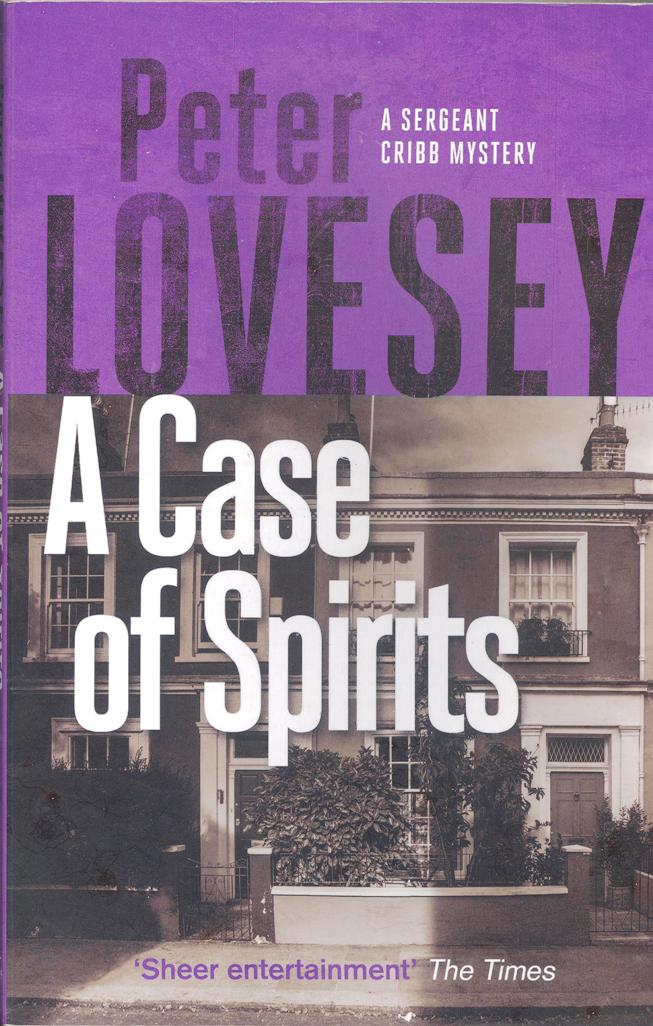
I read this book in January, 2025
This is book 6 in the Sergeant Cribb and Constable Thackeray series by Peter Lovesey, and it is set in 1885 in the Victorian age. I thought the book was a bit slow to get going, but I ended up quite enjoying this tale. I will stick to my Characters, then Personal Lives, and finally Plot sequence.
Characters :
Sergeant Cribb is a Scotland Yard detective, based obviously in London.
Constable Thackeray appears to be the constable of choice to assist Cribb.
DI Jowett is Cribb's boss.
Dr Augustus Probert of the Royal Society has a valuable painting stolen. He is married to Winifred, and has a 19 year old daughter Alice who is engaged to Captain William Nye.
Peter Brand (22) is a medium.
Professor Quayle is also a medium, but past his prime. Peter Brand is staying with him.
Miss Latetia Crush (40ish) frequents seances, and has a vase stolen.
Charlie Brand is Peter's dad. He is a cabman no 469.
Dr Benjamin is a medical doctor who performs Peter's PM.
Mr Cage is an expert in electricity.
Personal Lives : Strangely, we hear almost nothing of Cribb and Thackeray's personal lives, - are they married, do the have children - we have no idea? We do know that Cribb lives in a new house in a good district - or was that DI Jowett, it's not clear ? It's a very class ridden, hierarchical society / times. Cribb has no thought for Thackeray's well being. Thackeray has spent the night out in the frost keeping an eye on a suspect's house. Cribb turns up, and sends Thackeray off on another task, with no rest - whilst Cribb announces he off to get some sleep. Thackeray does detour for a bowl of warming soup - at a cost of 2d.
Plot : The story concerns a dodgy medium, Peter Brand, conducting fake seances ( aren't all seances fake ?). First however, I'll retell a story from the middle of the book, as told by Peter's dad, cabman 469, Charlie Brand. Years ago, Charlie had a horse that was skin and bones - he called it Ezekiel from the biblical story of the bones that came alive. Anyway, one day, Ezekiel and Charlie were specially selected by a servant to take his mistress for a ride. Ten minutes into the ride, she told Charlie to stop, and asked if she could give a carrot to Ezekiel. She was concerned about animal welfare. This was repeated for daily outings, always a carrot for the horse, soon supplemented with a bag of the finest oats. Eventually in a country spot where there was plenty grass for Ezekiel she announced that this was the final trip - Ezekiel had put on weight. Thank you, she said, kissing Charlie on the cheek. Charlie kissed her back, one thing lead to another, and "both Ezekiel and Charlie got their oats that day". The significance of this story is that the lady got pregnant, had the baby, and later gave it to Charlie to bring it up, but she continued to provided for the child's welfare. That lady was Miss Crush, a frequenter of seances, and the baby was the medium Peter Brand.
The story opens with DI Jowett summonsing Cribb and Thackeray to join him at the Royal Academy of Arts to study a nude painting, the duplicate of one stolen from a Dr Probert. Probert had married his wife for her money, and used it to buy valuable nude portraits by great artists. He kept these hung in a special room, behind curtains. One of the paintings had been stolen. A man of influence, he called in Scotland Yard, and Cribb and Thackeray were assigned to the case. There had been a seance at Dr Probert's that night, and strangely, one of the attendees was Miss Crush, who also had a vase stolen after her seance. The medium Peter Brand was present at both seances, and had time thereafter to do the stealing. When quizzed by Cribb he denied any knowledge of the thefts, pointing out that if he had been the thief he would have stolen Miss Crush's best vase, not the cheaper one taken. He claims to get 10 guineas per seance and would be crazy to risk his reputation by stealing.
Present at the seances were Dr Probert, his daughter Alice, her fiance Capt William Nye, Mr Strathmore, a man of science, and Miss Crush. Strathmore is a member of the Lads - i.e. Life After Death Society. He longs to prove that such a thing is possible, but in 12 years of investigations has yet to find a genuine medium. However, he has high hopes of Peter Brand ! Thackeray, Cribb and Jowett attend a public hall display of Brand's powers. The Chairman is Professor Quayle, a failing medium who is championing the young Brand. After a request for personal items in an envelope, Thackeray hands up his handcuffs. Brand turns white at the sight of handcuffs and makes off. Chairman Quayle says handcuffs are not personal items.
DI Jowett attends another seance at Dr Proberts, where Brand has agreed to subject himself to scientific examination. He will sit behind a curtain ( to avoid distractions) sitting in a low current "electric chair" with hands holding brass handles on each arm of the chair. If he lets go, the current is broken, and he is fraud. There is high drama! A Spirit appears, that of Miss Crush's Uncle Walter, and throws fruit at Captain Nye. One item of fruit misses but hits and breaks a vase, spilling water. The seance stops, Brand mops up the water with his hankie, the seance resumes, Cribb blunders in to the room chasing a burglar suspect (Prof Quayle) and Brand is found dead, electrocuted. It could not have happened by accident. The clue is the wet hankie, but who is the murderer and why?
Several have been colluding in the seances - Miss Crush (Peter is her son), Alice and Dr Probert. All are blackmail victims. Alice had been posing nude for a male artist, but others thought she was meeting a secret lover, and betraying Capt Nye.
Do read the story to see how it all works out. Poor Thackeray gets a black eye, and paid out ten shillings for information that Cribb had worked out for himself. As I said, it's a good story in the end. I don't write spoilers, and so have not disclosed the murderer.
Links to author index and home page
| Peter Lovesey Heading | Author Index | Go to Home Page |
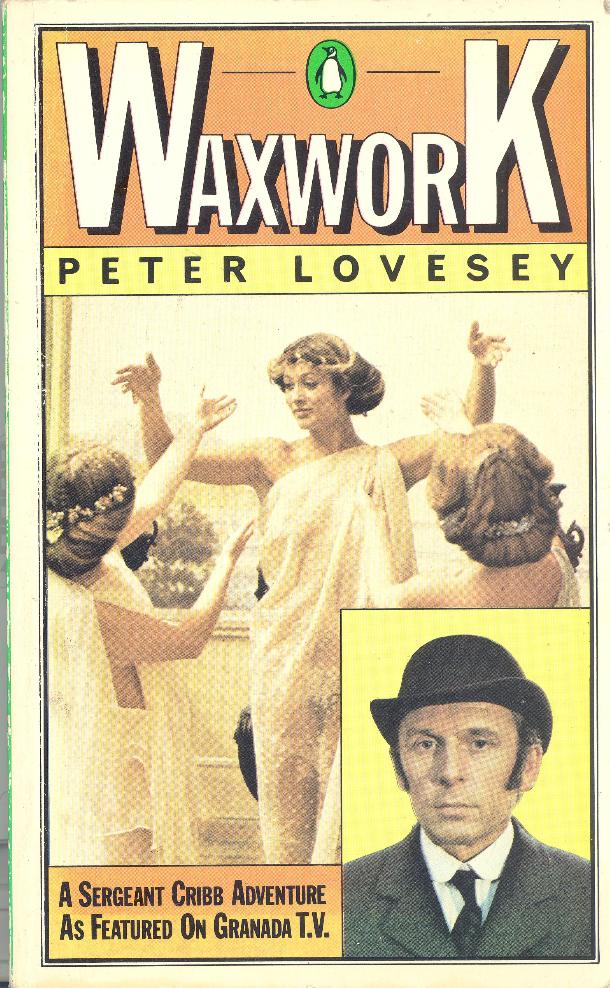
I read this book in February, 2020.
This is book 8, and, I think, the final book in Peter Lovesey's Sergeant Cribb series, set in Victorian London. Lovesey does his research well, and we get a good impression of 1880s London, of the state of photography then, of the horrors of Newgate prison, of the public hangman, and of the street morals of the time. This is a well written story - it won the silver dagger award for fiction for that year.
The book opens with a man at home with his wife. He takes a strange interest in murder crimes, and has morbid pictures of convicted murderers on his mantel piece. He is James Berry - the public hangman - and the latest murder case in the papers is the Kew murder.
Here, Miriam Cromer is charged with the death by poisoning of Josiah Percival, her photographer husband's assistant. Before the trial Miriam takes everyone by surprise by confessing to the murder. She said she had been tricked in her youth to pose with two chums for "artistic" photos, that Percival had got copies and was blackmailing her. She made several payments of about £10 each (pawning jewellery to get the cash), but when he wanted £150 which was beyond her, she poisoned him. She was sentenced to death, and locked up in Newgate prison.
The poison had been locked up in a secure cabinet, to which there were only two keys - Mr Cromer had one, and his assistant Percival had the other. Mr Cromer was away on business that day, and his picture appeared in the papers. One picture showed the key to the poison cabinet in his possession, and was sent to the home secretary. How could Miriam have got hold of poison without the key ? Was Miriam's conviction safe ? Chief inspector Jowett was asked to investigate, and he quickly farmed off the request to Cribb. Cribb is now 50, and still a sergeant. He is too good at his job to be promoted, and doesn't play police politics. Cribb investigates, and discovers all sorts of things that cast doubt on the conviction. But the powers that be don't want the case reopened - they just want a white wash. Cribb is furious, but what can he do ?
And so a very clever story unfolds. In essence, is Miriam guilty, or did she lie when she confessed, or is it a double bluff ? It's not a long story, and it's really well told.
Links to author index and home page
| Peter Lovesey Heading | Author Index | Go to Home Page |